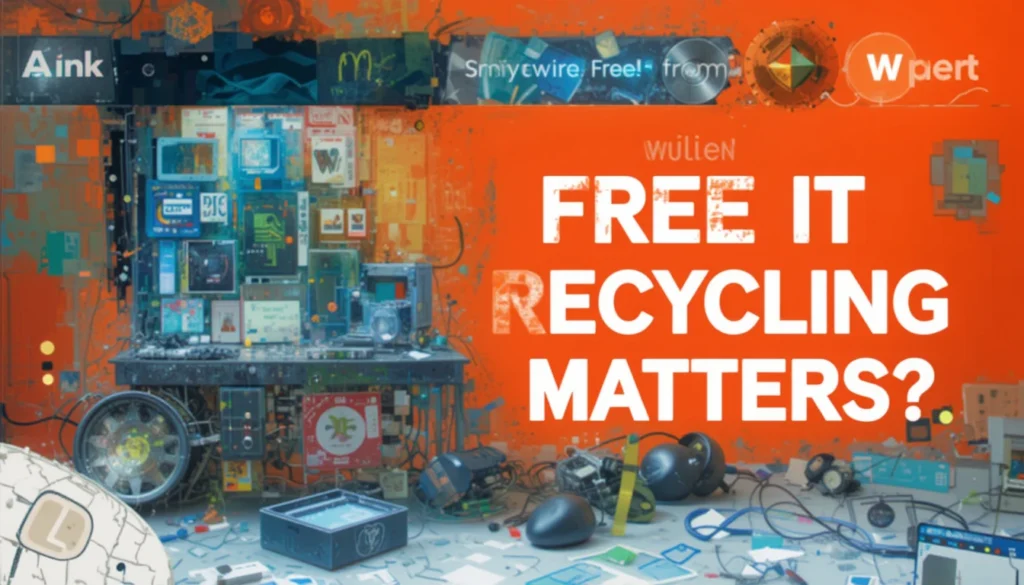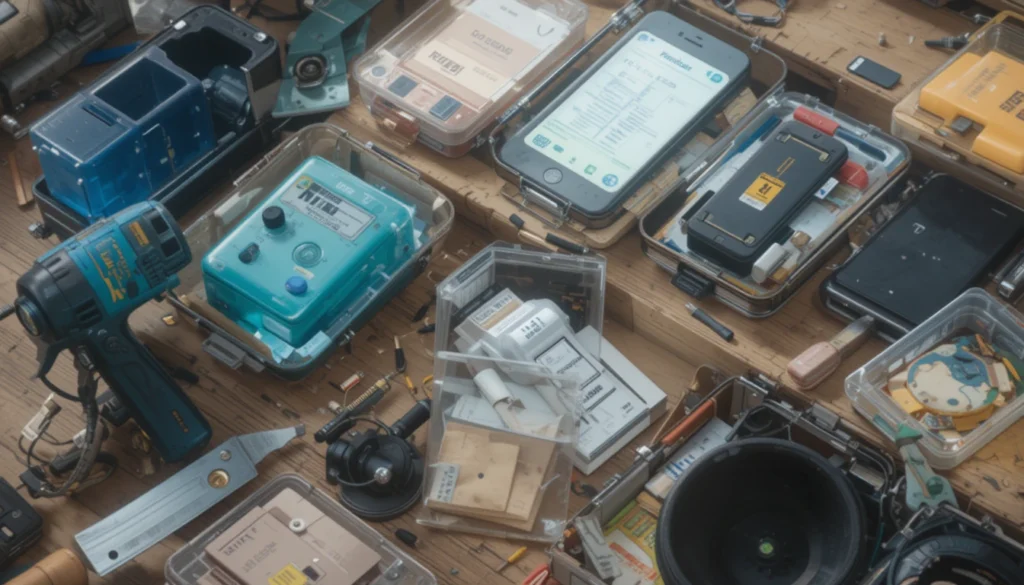As technology continues to evolve at lightning speed, old computers, laptops, printers, and accessories are quickly replaced with newer faster models. But what happens to the outdated tech? If improperly discarded electronic waste (e-waste) can severely harm the environment. Thankfully free IT recycling options make it easier than ever to dispose of your electronics responsibly, safely, and at no cost.
This comprehensive guide covers everything you need to know about free computer recycling, e-waste solutions, and data-secure device disposal, making sure you stay eco-conscious while decluttering your digital life.
What is Free IT Recycling?
Free IT recycling is the process of safely disposing of old or unwanted computers, laptops, and electronic accessories without paying a fee. Instead of tossing outdated tech in the trash where it could leak harmful materials into the environment this method ensures devices are either responsibly recycled, securely destroyed, or even reused when possible. Many retailers, nonprofits, and certified recycling centers offer these services to help individuals and businesses reduce e-waste. It’s an easy, cost-free way to declutter your home or office while making a positive impact on the planet.
You have to Read: How UK Businesses Can Securely Dispose of Old IT Equipment and Recycle Responsibly
Why Free IT Recycling Matters?

The global e-waste crisis is real. According to the Global E-Waste Monitor, over 50 million metric tons of electronic waste are generated each year. Shockingly, less than 20% of that is properly recycled. This leads to toxic materials like lead, cadmium, and mercury polluting our soil and water systems.
Responsible e-waste disposal also protects human health and ecosystems from exposure to hazardous substances. When electronics are recycled properly, their valuable materials such as copper, gold, aluminum, and rare earth elements can be recovered and reused, reducing the need for destructive mining operations. Furthermore, safe recycling practices help limit greenhouse gas emissions by cutting down the energy required to manufacture new electronics from raw materials. In short, every responsibly recycled device is a win for the environment, economy, and society at large.
What Types of Electronics Can Be Recycled for Free?
- Laptops
- Desktop computers
- Monitors (some places may charge for old models)
- Keyboards and mice
- Cables and chargers
- USB drives and external hard drives
- Smartphones
- Tablets
- Smartwatches
- eReaders
- Routers and modems
- Printers (free in some programs)
- Scanners and fax machines
- DVD and Blu-ray players
- Game consoles
- Speakers and headphones
- Power adapters and surge protectors
- Battery backups (UPS)
- SD cards and memory sticks
- Projectors
- Barcode scanners
- Cash registers
- Point-of-sale (POS) systems
Take Analysis To: Computer Recycling Leicester – Safe Data Wipe & Fast Service!
Major Retailers Offering Free Recycling Services — Find Out How?
Best Buy – One of the Broadest Recycling Programs:
Best Buy is one of the most well-known retailers offering free recycling for a wide range of electronics. From laptops and desktops to routers and even select appliances, their in-store drop-off service is straightforward. While they do charge a small fee for certain items like monitors and TVs, most small electronics can be dropped off at no cost. Just make sure to wipe your data first!
Staples – Free Recycling, No Purchase Required:
Staples accepts various devices like laptops, keyboards, mice, routers, and printers, even if they weren’t purchased from them. You can bring up to 7 items per customer per day, and they even offer free battery recycling boxes for home use. If you run a small business or have home office equipment to discard, Staples is an excellent choice.
Office Depot – Trade In or Drop Off:
Office Depot has a tech trade-in program, where you may get store credit if your old devices have resale value. If not, they’ll still accept the item for free recycling. They also offer prepaid recycling boxes for bulk items, but basic in-store drop-offs for individual electronics are often free of charge if the items aren’t eligible for trade-in.
Apple – Free Device Recycling and Trade-In:
Apple runs a global free recycling program, accepting not only Apple devices but also products from other brands. If your old device is still functional, Apple may offer credit toward a future purchase. Otherwise, they’ll recycle it for free. This is a great option if you’re concerned about data security, as Apple wipes all devices responsibly.
Dell – Mail-in Recycling With No Extra Charges
Dell offers a mail-in recycling program that’s completely free. You simply print out a prepaid shipping label, pack your item, and send it off. It’s ideal for those who can’t visit a physical store. Dell accepts any brand, and businesses can also take advantage of their asset recovery services.
Do You Know? Computer Recycling – A Complete Guide!
How to Prepare Devices for Drop-Off or Collection?

Before handing over your old electronics for recycling, a little preparation goes a long way. Start by backing up any important files you may still need, then log out of all accounts and perform a factory reset or use secure data-wiping software to remove personal information. If the device contains removable batteries, take them out and check if they require separate disposal. It’s also helpful to organize power cords, adapters, and accessories by bundling them together neatly with the device. Proper preparation not only protects your data but also streamlines the recycling process for service providers.
What Are the Best Tips for Businesses Handling Bulk and Corporate E-Waste?
- Partner with certified IT recyclers who specialize in bulk e-waste services.
- Schedule regular pickups to prevent accumulation of outdated devices.
- Request data destruction certificates to ensure compliance with privacy laws.
- Donate usable items to nonprofits, schools, or community programs.
- Keep detailed inventory records for tracking and audit purposes.
- Explore manufacturer take-back programs that offer rebates or credit.
- Train staff on responsible e-waste practices to encourage sustainable habits.
- Assign a dedicated e-waste coordinator to oversee recycling procedures and ensure compliance.
- Review local and international compliance laws to avoid legal and regulatory pitfalls.
- Include IT recycling in your company’s sustainability goals to promote accountability and transparency.
You have to Read: Certified Data Destruction – Top Methods, Tools & Compliance Tips!
Future of IT Recycling — Trends and Innovations!

The future of IT recycling is evolving rapidly, driven by technological advancements and increasing environmental awareness. One of the most promising trends is the integration of artificial intelligence (AI) and robotics in sorting and processing electronic waste. These innovations improve accuracy and efficiency by identifying and separating materials that were previously difficult to sort, thereby enhancing recycling rates and reducing contamination. Additionally, blockchain technology is gaining traction as a tool for transparent tracking of e-waste, ensuring that devices follow a responsible recycling chain and minimizing illegal dumping. On the policy side, many governments worldwide are adopting Extended Producer Responsibility (EPR) laws, which require manufacturers to take back end-of-life products and manage their recycling. This shift encourages eco-friendly product design and promotes a circular economy. Furthermore, there is a growing emphasis on manufacturer take-back programs, with companies offering more convenient options for consumers to return used electronics. Overall, these innovations promise to make IT recycling more sustainable, secure, and accessible in the years ahead.
FAQs:
What electronics can I recycle for free?
Most programs accept computers, laptops, tablets, printers, and peripherals. Some may charge for monitors or specialized equipment.
Is my personal data safe when I recycle electronics?
You should always wipe or erase data before recycling. Many recyclers don’t perform data destruction, so it’s your responsibility to protect your information.
Are there fees for recycling my old devices?
Many retailers and recycling centers offer free services for common electronics. Some items, like monitors, may incur a small fee.
How do businesses recycle large amounts of e-waste?
Businesses should partner with certified recyclers who provide bulk pickup, secure data destruction, and compliance documentation.
Why is e-waste recycling important for the environment?
Recycling recovers valuable materials, reduces toxic waste, and lowers the need for mining, helping protect ecosystems and reduce pollution.
Conclusion:
Free IT recycling is a vital step toward reducing the environmental impact of outdated electronics while safeguarding personal data and recovering valuable materials. With a growing number of accessible programs offered by major retailers, specialized services, and local recycling centers, responsibly disposing of your old computers, laptops, and accessories has never been easier or more convenient.
Latest Post:
- Computer Recycling London — Top Rated Services!
- The Ultimate Guide to Certified Data Destruction and IT Recycling in the UK
- Why Secure Data Destruction Is Non-Negotiable in 2025


